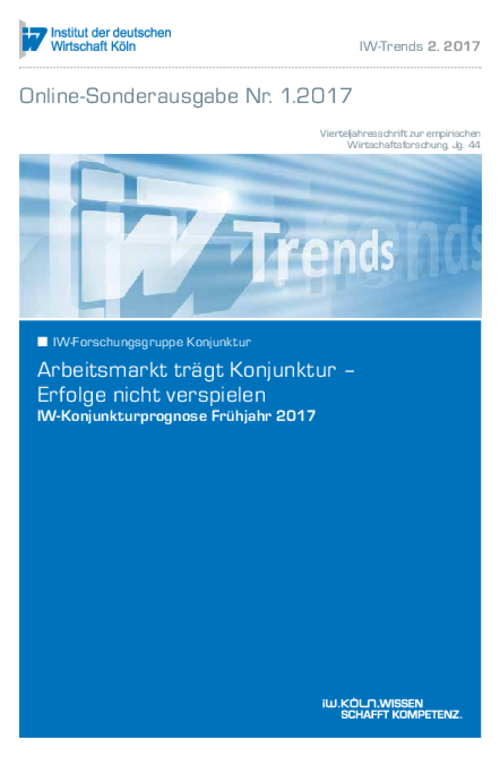The German economy remains on an expansion course, with real gross domestic product expected to grow by over 1 ½ percent in 2017 and by 1 ¾ percent in 2018, the lower number of working days acting as a brake on macroeconomic performance in the current year.

Economy Buoyed by the Labour Market: Successes Not to Be Squandered IW Economic Forecast Spring 2017
IW-Trends

The German economy remains on an expansion course, with real gross domestic product expected to grow by over 1 ½ percent in 2017 and by 1 ¾ percent in 2018, the lower number of working days acting as a brake on macroeconomic performance in the current year.
This economic continuity is astounding in view of the high level of political uncertainty. Indeed, the short-term outlook for the global economy is being revised upwards. Despite the political dangers and latent hostility to trade, at a rate of around 3 ½ per cent world production is set to expand more rapidly than in previous years, though global trade is growing at a slightly slower pace. This environment is providing German foreign trade with a perceptible impetus. Overall, the contribution of foreign trade will dampen German growth slightly in 2017 and 2018 and the country’s current account surplus is expected to shrink. The outlook for German corporate investment has again improved considerably, with investment in construction particularly resilient. In 2017 and 2018, a total of 1 million new jobs will be created in Germany and unemployment is expected to fall to an average of just over 5½ percent in 2018. As a result of this ongoing boom in the labour market, private consumption will continue to be the main economic stimulus. Government consumption expenditure also remains strongly expansive, so that private and public sector consumption combined will contribute more than 1 percentage point to growth in each year of the forecast. Price trends will slow the rise in consumption much more clearly than in previous years. With government spending rising more rapidly than revenues, the public sector surplus is expected to fall to around 13 billion euros in 2018.

Forschungsgruppe Gesamtwirtschaftliche Analysen und Konjunktur: IW-Konjunkturprognose Frühjahr 2017: Arbeitsmarkt trägt Konjunktur – Erfolge nicht verspielen
IW-Trends

More on the topic

Determinants of personnel planning in Germany
The German labor market has been growing since 2005. The dip in the wake of the coronavirus pandemic between 2020 and 2022 is an exception, as the German labor market has reached a record level of 45.9 million people in employment by 2023.
IW
Effects of the Middle East conflict on the German economy
Beyond the humanitarian crisis associated with the geopolitical conflict in Israel, which affects millions of human lives, the Middle East conflict also leaves lasting marks on economic activity not only in the affected region, but also in Germany and the ...
IW